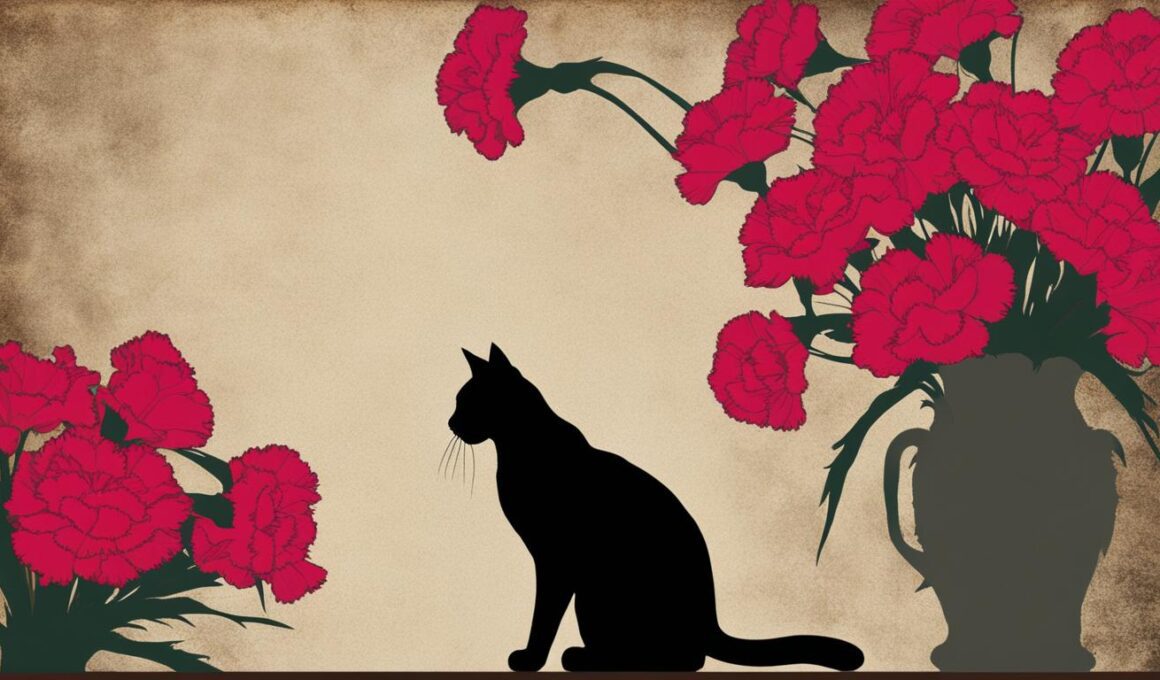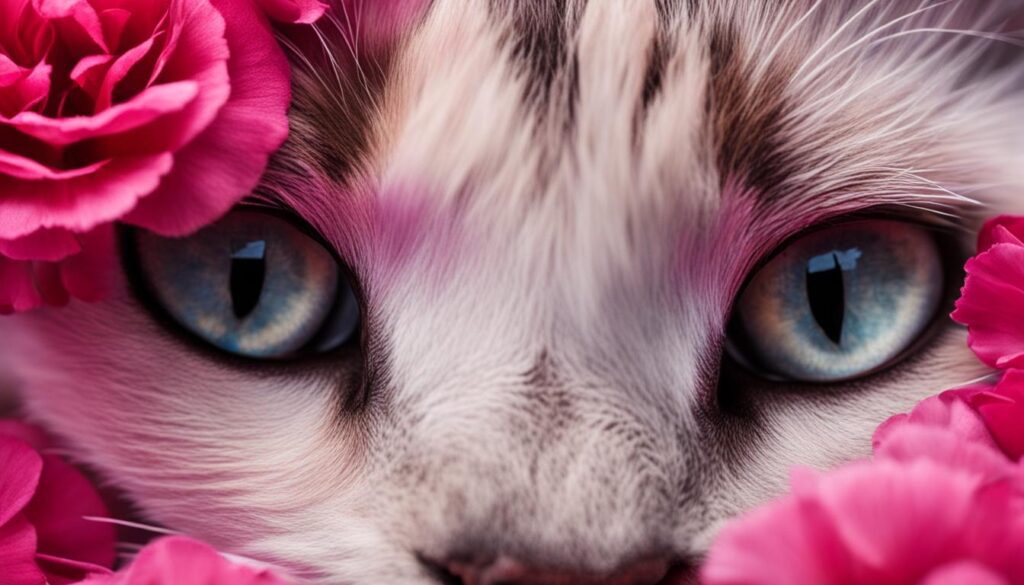If you’re a cat owner, you know how curious and inquisitive our feline friends can be. But did you know that some seemingly harmless flowers can actually be toxic to cats? One such flower is the beautiful carnation. While these flowers may brighten up your home or garden, they pose a potential risk to your furry companion.
Carnations are known to be toxic to cats, along with several other flowers. Ingesting carnations can cause gastrointestinal upset in cats, leading to uncomfortable symptoms such as vomiting and diarrhea. These flowers contain triterpenoid saponins which can also cause dermatitis if the sap comes into contact with your cat’s skin.
While carnation toxicity is not typically fatal, it’s important to prioritize your pet’s safety and keep these flowers away from them. As a responsible pet owner, it’s crucial to be aware of which plants can pose a risk to your cat’s health.
Stay tuned to learn more about the symptoms of carnation toxicity in cats, other toxic flowers to avoid, and how to keep your beloved feline safe from potential harm.
Symptoms of Carnation Toxicity in Cats
When a cat ingests carnations, they may experience symptoms of carnation toxicity. These symptoms can include drooling, vomiting, and diarrhea. The sap of the carnation plant can also cause dermatitis, resulting in skin irritation and inflammation. While these symptoms are usually mild and resolve on their own, it is still important to monitor your cat closely if they have ingested carnations.
Carnations may be beautiful and fragrant, but they can pose a risk to our feline friends. If you notice any of these symptoms or suspect that your cat has come into contact with carnations, it’s important to take appropriate action to ensure your cat’s well-being.
Other Toxic Flowers for Cats
In addition to carnations, there are several other flowers that can be toxic to cats. It’s important to be aware of these flowers to ensure the safety of your feline friend. Here are some examples of toxic flowers for cats:
- Orchids: Depending on the specific variety, orchids can be toxic to cats. Ingesting orchids can cause symptoms such as vomiting, diarrhea, and gastrointestinal upset.
- Hydrangea: Hydrangea is another flower that is toxic to cats. It can cause various symptoms including vomiting, diarrhea, drooling, and even depression.
- Tulips: Tulips contain toxins that can be harmful to cats. Ingesting tulips can lead to symptoms like vomiting, diarrhea, and increased heart rate.
- Mums: Mums, also known as chrysanthemums, are toxic to cats. They can cause gastrointestinal issues such as vomiting and diarrhea.
- Calla Lilies: Calla lilies are poisonous to cats. If a cat ingests any part of the plant, it can experience symptoms like oral irritation, drooling, and difficulty swallowing.
- Daffodils: Daffodils can be highly toxic to cats. Ingestion of daffodil bulbs or any part of the plant can result in severe symptoms like vomiting, diarrhea, tremors, and even cardiac arrhythmias.
- Daisies: Certain types of daisies, such as gerbera daisies and pyrethrum daisies, are toxic to cats. Ingestion can lead to gastrointestinal upset, drooling, and skin irritation.
These are just a few examples of the toxic flowers that can pose a risk to your cat’s health. It is crucial to keep these flowers away from your feline companion to prevent any potential harm. When arranging flowers in your home, make sure to choose cat-friendly alternatives that are non-toxic, such as roses, sunflowers, African violets, zinnias, and asters. By being mindful of the flowers you bring into your home, you can create a safe and enjoyable environment for both you and your beloved cat.
Keeping Your Cat Safe from Toxic Flowers
To ensure the pet safety of your beloved cat, it is crucial to take proactive measures in preventing their exposure to toxic flowers. One of the key steps you can take is to avoid having flowers like carnations, lilies, tulips, and daisies in your home or garden where your cat can easily access them. These flowers are known to be toxic to cats and can pose a risk to their health.
Instead, consider choosing cat-friendly flowers that are non-toxic and safe for feline companions. Roses, sunflowers, orchids, African Violets, zinnias, and asters are excellent alternatives to enjoy the beauty of flowers without putting your cat at risk. By selecting these cat-friendly options, you can create a pet-friendly environment in your home.
When it comes to ensuring the safety of your cat, it is always wise to consult reliable sources like the ASPCA website for a comprehensive list of toxic and non-toxic plants. This will help you make informed decisions about the flowers and plants you bring into your home. Prevention is key in keeping your feline friend safe, so take the necessary precautions to avoid any potential harm.
Can Carnations Harm Cats if They Come in Contact with Poisonous Plants in Florida?
Yes, carnations can harm cats if they come in contact with poisonous plants in Florida. It’s important to be aware of the potential dangers of poisonous plants in Florida and take precautionary measures to ensure the safety of pets.










